Virus cases in Libya up 15-fold in 2 months: Red Cross
Red Cross president meets Prime Minister Fayez al-Sarraj, warlord Khalifa Haftar, says situation in country bad

GENEVA
COVID-19 cases in Libya have risen more than 15-fold in less than two months, spiking from 571 in June to more than 9,000 today, the Red Cross said Thursday.
More than half a million people need healthcare assistance as conflict, COVID-19, and economic collapse threaten to plunge hundreds of thousands of civilians deeper into chaos, said the Geneva-based International Committee of the Red Cross (ICRC).
ICRC President Peter Maurer said at the end of a visit to the country this week that Libyans are reeling from nine years of conflict. He said Libyan families had been bombed out of their homes, healthcare facilities destroyed, infrastructure has crumbled, and the economy has collapsed.
“In Benghazi and [the capital] Tripoli, I saw firsthand how civilians are suffering because of the catastrophic consequences of this conflict,” said Maurer.
The ICRC said that in Benghazi, Maurer met with eastern Libya-based warlord Khalifa Haftar. That was followed by a meeting in Tripoli with Fayez al-Sarraj, Prime Minister of Libya’s legitimate government, the Government of National Accord (GNA).
Following the ouster of late ruler Muammar Gaddafi in 2011, Libya's government was founded in 2015 under a UN-led political deal. Since April 2019, the government has been under attack by Haftar's forces, based in eastern Libya, and more than 1,000 people have been killed in the violence.
Recently government forces have turned the tide and forced Haftar’s retreat, with Haftar’s forces leaving behind dangerous munitions and bombs in their wake.
Maurer added: “Neighborhoods on the former frontlines in Tripoli are badly scarred, and families have little to return to. People are also at risk of being killed or injured by dangerous unexploded munitions.”
While all this happened, infrastructure all over the country, which spans at least 1.8 million square kilometers [695,000 square miles] and is Africa’s fourth-largest, is falling apart, said Maurer. “People have little electricity, drinking water, sanitation, or medical care in the middle of a growing pandemic.”
In Benghazi, Maurer also met the leadership of the Libyan Red Crescent, which he said has been playing a role in stopping the spread of COVID-19.
Healthcare system in shambles
The ICRC said the conflict had battered Libya’s healthcare system. Many hospitals and clinics have been damaged in the fighting, while others were forced to shut their doors because they were close to the frontlines. Other facilities are decaying from underinvestment.
The economic impact of the conflict and COVID-19 is also being felt. Most people surveyed by the ICRC said their livelihoods have suffered due to COVID-19.
Daily wage earners and migrants are the hardest-hit as income opportunities have evaporated. Prices of staple foods have increased by about 20% on average, but doubled in some areas.
Prices are expected to climb further since Libya imports most of its food, and oil production has ground to a halt due to a blockade by Haftar. Milk, vegetables, bread, and fuel are already in short supply, said the ICRC.




